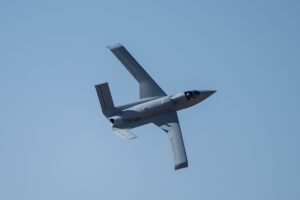U.S. AIR FORCE PLANT 42 PALMDALE, Calif.—Northrop Grumman [NOC] on Sept. 8 unveiled the Model 401 aircraft, built by the Burt Rutan-founded, Northrop Grumman-owned Scaled Composites for an unnamed “very generous” customer in the words of Scaled Composites President Cory Bird.
The two manned, unpressurized aircraft built and flown by Scaled Composites test pilots over the last four years use Pratt & Whitney
[RTX] JT-15D engines and have a ceiling of 25,000 feet, gross weight of 7,500 pounds, and a 2,000 pound payload capacity.

The sleek, Model 401 design, which relies on a simplified mechanical flight control system, is to serve as the progenitor of an unmanned Model 437 aircraft to meet U.S. Air Force and other customer requirements for ISR and strike aircraft that can survive in highly contested environments.
Bird, an aircraft designer who worked with Rutan for 26 years, said that the Model 437 may have a cost of $5 million to $6 million per aircraft, including a $2.4 million FJ-44A engine by Williams International. With a top speed of .85 Mach, the Model 437 is to be able to fly alongside the Lockheed Martin [LMT] F-35, Bird said. Model 437 is to have a 3,000 nautical mile range and to be able to host different systems, including side looking radars and two Raytheon Technologies [RTX] AIM-120 advanced medium-range air-to-air missiles.
Northrop Grumman views the Model 437 as a possible forward sensor or “carriage extension” for manned fighters in contested environments. Bird said that Scaled Composites has devoted “quite a lot of energy” to signature reduction for the Model 401 and future Model 437. Scaled Composites test pilot Brian Maisler said that the Model 401 has demonstrated a short 2,500 foot capacity and can comfortably take-off and land on a 4,000 foot long, 50-foot-wide road, versus a typical, 6,000 foot prepared runway. Maisler has 200 flight hours in the Model 401 and is one of half a dozen Model 401 test pilots from civilian, U.S. Navy and Air Force backgrounds. Northrop Grumman, which occupies 66 percent of Plant 42, said that Site 7 doubles the company’s capacity to host High Altitude Long Endurance (HALE) drones. The site continues the 1960s legacy of the Northrop Grumman F-5s and T-38 Talons built there.